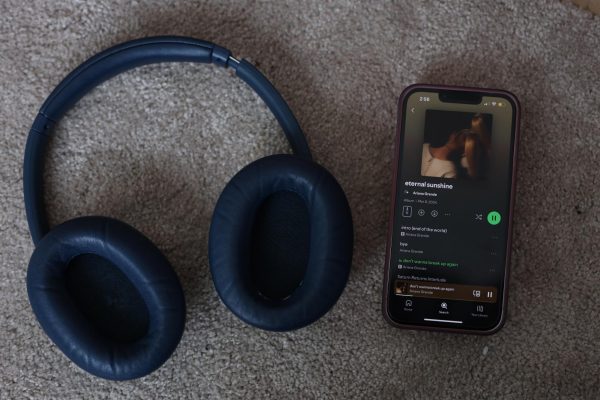“Songs” Is a Melancholy Sensation

Big Thief frontwoman Adrianne Lenker released a double album of “songs” and “intsrumentals.” (Courtesy of Facebook)
Adrianne Lenker’s music evokes imagery. It is not immediately apparent what makes this true; in fact, there’s probably not one right answer. It may be her voice, which glides between moments of ethereal serenity and commanding power with incredible ease. It may be her lyrics, which are at some times profoundly simple, at other times richly dense and at all times hauntingly beautiful. It may be her guitar, which cascades and breathes along with Lenker as if it is an organ of its own. Most likely, it is some fluctuating combination of the three that makes the music she creates so vivid. On “songs” and “instrumentals,” the latest solo efforts from the frontwoman of Brooklyn indie folk outfit Big Thief, Lenker conjures images of autumn, fog, heartbreak and loss. The double album is yet another demonstration of Lenker’s incredible talent as she strips away nearly everything except for her voice and guitar and creates one of 2020’s most stunning pieces of music.
Lending to the vivid imagery that “songs” and “instrumentals” bring about is the context in which the double album was recorded. Shortly after returning home from touring in Europe with Big Thief due to coronavirus restrictions, Lenker retreated to a one-room cabin in the foothills of western Massachusetts. She became enamored with its sounds, telling the New Yorker it sounded like “the inside of an acoustic guitar,” and subsequently enlisted engineer Phil Weinrobe to help her record the albums there. The cabin’s voice bleeds through the final product: birds chirp, wind swirls and rain falls on the roof. These familiar sounds create the distinct feeling of being in the cabin with Lenker, breathing a raw intimacy into the double album that doesn’t waver once throughout its 80-minute runtime.
Lenker’s lyrics are even more intimate than the sounds that surround them, especially due to her recent breakup with fellow folk artist Indigo Sparke. From the first moments of the record, Lenker is crushingly candid: “Is it a crime to say / I still need you?” she asks on opener “two reverse.” Here, and throughout “songs,” Lenker displays some of her most personal songwriting, even alongside her work with Big Thief. These intensely personal lyrics often swell into profound musings: On the album’s second song, “ingydar,” she spends the first verse describing how “the juice of dark cherries cover his chin” before pondering existence’s cyclical nature in the chorus, repeating that “Everything eats and is eaten, time is fed.”
The lyrical complexity of Lenker’s music is perhaps unsurprising (though nonetheless breathtaking) considering she has been writing songs since the age of eight. Now 29, she has released four albums with Big Thief since its formation in 2015 and two solo albums before “songs” and “instrumentals.” Still, the devastating intimacy of Lenker’s words is stronger here than it has ever been, largely due to the painful specificity with which she recounts her breakup. On “anything,” which Lenker released when announcing “songs” and “instrumentals” in early September, she aches longingly for the small moments with Sparke she no longer has: “I wanna sleep in your car while you’rе driving / Lay in your lap when I’m crying.” If Lenker’s voice wasn’t so hauntingly soft, “anything” would feel like an invasion of privacy.
At the center of “songs” are “half return” and “come,” which stray from the topic of Lenker’s breakup but continue the melancholic beauty of the previous tracks. The morose lyrics of the latter are as dark as anything Lenker writes of her relationship on “songs,” as a mother asks her daughter to “come help me die.” If it weren’t for her gracefully drifting guitar, the song might be too heavy, but her fingerpicking gives the song just enough life to keep it moving.
Throughout the album as a whole, Lenker’s guitar skills, which she studied at the Berklee College of Music, prove to be perhaps the most vital component of “songs” and “instrumentals.” Her guitar acts not as a separate piece but instead as an extension of Lenker; it breathes with her, accompanying her through every lull and tremble in her voice. The sparse guitar of album highlight “zombie girl” gives Lenker’s voice room when she sings “How your words ring through / Something kinda sweet and blue,” allowing her own words to do the same. As she sings “[I] cover you with music” later on the track, the guitar is given just a little more life. These understated intricacies contribute to the consistent singularity “songs” and “instrumentals” exude; rather than hearing instruments and voices individually, the double album plays as a cohesive collection of sounds. Despite Lenker’s lyrical density, it’s surprisingly easy to let “songs” and “instrumentals” wash over you like a gentle wave.
When lyrics disappear in the double album’s second half, “instrumentals,” it becomes even easier. “instrumentals” is broken up into two long tracks, “music for indigo” and “mostly chimes.” The former is as beautiful as anything on “songs.” Even without Lenker’s ethereal vocals, “music for indigo” manages to find pockets of bare emotion, warm comfort, chilling tranquility and sprawling beauty. The noises of the cabin are most effective here, as rain falls and birds chirp throughout. At some points, what sounds like someone shuffling around a room is heard. It’s easy to imagine being in the cabin with Lenker with a warm mug in hand, watching a raindrop slide down the window and occasionally shifting focus to the autumn-colored trees that lie beyond it. Nineteen minutes into the track, the only words on “instrumentals” are softly spoken: “I’m starting over.” Lenker makes no effort to discern whether she’s referring to the music or something more abstract, but really, she doesn’t need to: The statement is profound enough in its subtlety.
The second half of “instrumentals” is the aptly-titled “mostly chimes.” At 16 minutes long, the track meanders at points and might not have worked if it wasn’t placed at the back of the project. Since it was, the track functions as a gradual finalization of Lenker’s meditation on heartbreak, even if the heartbreak itself is nowhere near finalized. The last guitar note is heard less than five minutes into the track, after which leaves rustle and chimes play; somewhere else, a stream trickles. “Mostly chimes” evokes the feeling that Lenker is walking out of the cabin that she recorded “songs” and “instrumentals” in, trying to leave in it the feelings that she poured into the double album. The clarity in the chimes contrasts with the haze of the previous 12 tracks to suggest that she has been at least temporarily successful — as if exploring love, death, existence and loss through music has distilled her emotions down to their core.
Adrianne Lenker’s music evokes imagery. “Songs” and “instrumentals” are perhaps the strongest testament to that claim; its beautiful complexities and unique recording invite the listener to sit next to Lenker and experience her trauma and heartache in a way not many albums do. By the time the last chime sounds on “mostly chimes,” the listener is left with nothing but the sound of leaves crunching underfoot. It’s hard not to be stunned by the uniquely delicate intensity of Lenker’s work. Between her solo projects and her work with Big Thief, Lenker has proven herself to be among music’s best songwriters, vocalists and guitar players. These three strengths combine on “songs” and “instrumentals,” resulting in an overwhelmingly beautiful and intimate tour de force.










































































































































































































